trekaddict: Yes, like I said I've got events made to keep the USSR from building 1000+ land units.
The Great Crusade: A MOD NN AAR
- Thread starter dannyboy2016
- Start date
-
We have updated our Community Code of Conduct. Please read through the new rules for the forum that are an integral part of Paradox Interactive’s User Agreement.
You are using an out of date browser. It may not display this or other websites correctly.
You should upgrade or use an alternative browser.
You should upgrade or use an alternative browser.
Fernando Torres: I'm kind of an HOI editing noob. Could you tell me how I could go about editing the ai building scheme?
Just send me the ai file of that mod by pm. (host it somewhere)danielshannon said:Fernando Torres: I'm kind of an HOI editing noob. Could you tell me how I could go about editing the ai building scheme?
I will pm you back with the new files so SOV won't build so much troops.
Fernando Torres said:Just send me the ai file of that mod by pm. (host it somewhere)
I will pm you back with the new files so SOV won't build so much troops.
Or better yet, pm it to me too.
Since my gmail seems to be acting up and others may want to play with this here is my initial saved game and the two event files that I've added/modified.
Fernando Torres: To the best of my knowledge, the game uses Armageddon 1.2's AI files.
Fernando Torres: To the best of my knowledge, the game uses Armageddon 1.2's AI files.
Armageddon 1.2 ???
If it uses the vanillas AI files, this issue must be due to the high ic and mp of SU. You will have to decrease it.
If it uses the vanillas AI files, this issue must be due to the high ic and mp of SU. You will have to decrease it.
Fernando Torres said:Armageddon 1.2 ???
If it uses the vanillas AI files, this issue must be due to the high ic and mp of SU. You will have to decrease it.
Whoops there I go again, living in the future. I meant Armageddon 1.1 files.
A suggestion: if you change the build priorities for the Soviet AI have them build a decent navy. ( maybe copy the US settings? ) Imagine... massive US and SU carrier fleets duking it out in teh atlantic....... 
Power tends to confuse itself with virtue and a great nation is particularly susceptible to the idea that its power is a sign of God's favor, conferring upon it a special responsibility for other nations — to make them richer and happier and wiser, to remake them, that is, in its own shining image. Power confuses itself with virtue and tends also to take itself for omnipotence. Once imbued with the idea of a mission, a great nation easily assumes that it has the means as well as the duty to do God's work.
-James William Fulbright
Brunswick Resolution
From Wikipedia, the free encyclopedia
The Brunswick Resolution was a Joint Resolution of the U.S. Congress passed in August 1964 in direct response to a minor artillery bombardment known as the Brunswick Incident. It is of historical significance because it gave U.S. President Franklin Delano Roosevelt authorization, without a formal Declaration of War by Congress, for the use of military force in North America. The Roosevelt administration subsequently cited the resolution as legal authority for its rapid escalation of U.S. military involvement in the Second World War.[1]
Background and Congressional action
The Brunswick Incident reportedly began with an attack by Mid Atlantic Republic Forces on the Brunswick, a small U.S. town, in the State of Maryland on February 18, 1939. The Mid Atlantic Republic subsequently insisted that it hadn't attacked — and that the entire event was a False Flag operation.
Within hours, Roosevelt announced, in a radio address to the American public, that U.S. citizens had been attacked. In a message he sent to Congress the following day, the President affirmed that "the Mid Atlantic Zone regime had conducted deliberate attacks against U.S. citizens."
Roosevelt requested approval of a resolution "expressing the unity and determination of the United States in supporting freedom and in protecting peace in North America". He said that the resolution should express support "for all necessary action to protect our Armed Forces" — but repeated previous assurances that "the United States... seeks no war". The president contended that the resolution would help "hostile nations... understand" that the United States was unified in its determination "to continue to protect its national interests and citizens."[2]
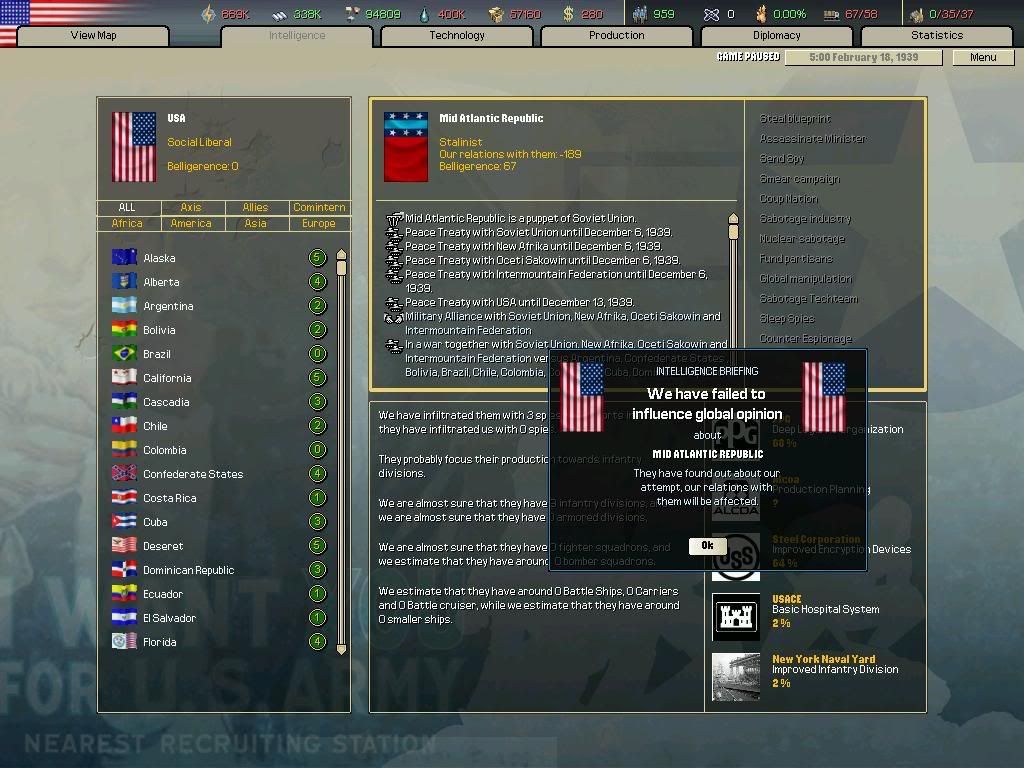
Few people outside of the USA believed the US Government's official version of the incident
After fewer than nine hours of committee consideration and floor debate, Congress voted, on February 20, 1939, on a joint resolution which authorized the president "to take all necessary steps, including the use of armed force, to assist any Americans requesting assistance in defense of their freedom."[5] The resolution passed unanimously in both houses.
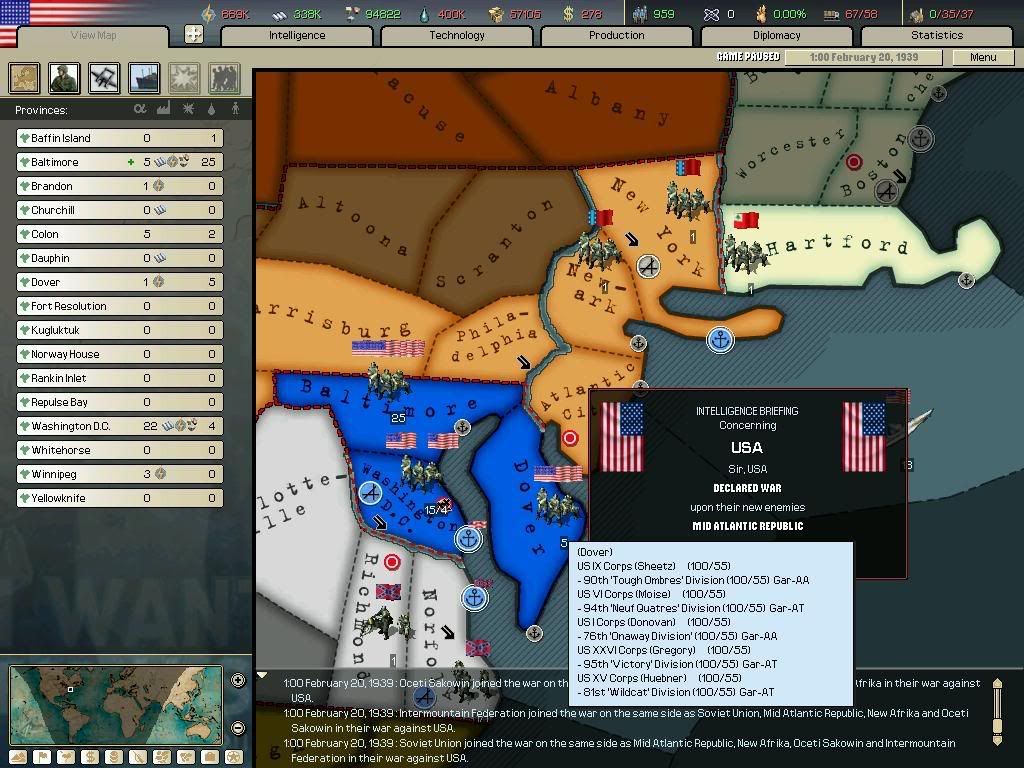
Roosevelt quickly put his Congressional mandate to use
Text of the Resolution
http://en.wikipedia.org/wiki/Brunswick_Resolution - Anonymous
-James William Fulbright
Brunswick Resolution
From Wikipedia, the free encyclopedia
The Brunswick Resolution was a Joint Resolution of the U.S. Congress passed in August 1964 in direct response to a minor artillery bombardment known as the Brunswick Incident. It is of historical significance because it gave U.S. President Franklin Delano Roosevelt authorization, without a formal Declaration of War by Congress, for the use of military force in North America. The Roosevelt administration subsequently cited the resolution as legal authority for its rapid escalation of U.S. military involvement in the Second World War.[1]
Background and Congressional action
The Brunswick Incident reportedly began with an attack by Mid Atlantic Republic Forces on the Brunswick, a small U.S. town, in the State of Maryland on February 18, 1939. The Mid Atlantic Republic subsequently insisted that it hadn't attacked — and that the entire event was a False Flag operation.
Within hours, Roosevelt announced, in a radio address to the American public, that U.S. citizens had been attacked. In a message he sent to Congress the following day, the President affirmed that "the Mid Atlantic Zone regime had conducted deliberate attacks against U.S. citizens."
Roosevelt requested approval of a resolution "expressing the unity and determination of the United States in supporting freedom and in protecting peace in North America". He said that the resolution should express support "for all necessary action to protect our Armed Forces" — but repeated previous assurances that "the United States... seeks no war". The president contended that the resolution would help "hostile nations... understand" that the United States was unified in its determination "to continue to protect its national interests and citizens."[2]

Few people outside of the USA believed the US Government's official version of the incident
After fewer than nine hours of committee consideration and floor debate, Congress voted, on February 20, 1939, on a joint resolution which authorized the president "to take all necessary steps, including the use of armed force, to assist any Americans requesting assistance in defense of their freedom."[5] The resolution passed unanimously in both houses.

Roosevelt quickly put his Congressional mandate to use
Text of the Resolution
Joint Resolution
To promote the maintenance of peace and security in the Americas
Whereas army units of the Communist regime in the Mid Atlantic occupied zone, in violation of the principles of international law; have deliberately and repeatedly shelled the small town of Brunswick, and thereby created a serious threat to peace; and
Whereas these attacks are part of a deliberate and systematic campaign of aggression that the Communist nations have been waging against their neighbors and the nations joined with them in the collective defense of their freedom; and
Whereas the United States is assisting the peoples of the Americas to protect their freedom and has no unjust territorial, military, or political ambitions in the area, but desires only that these peoples should be left in peace to work out their own destinies in their own way; Now, therefore, be it
Resolved by the Senate and House of Representatives of the United States of America in Congress assembled, that the Congress approves and supports the determination of the President, as commander in Chief, to take all necessary measures to repeal any armed attack against the forces of the United States and to prevent further aggression.
Sec. 2 The United States regards as vital to its national interests and to world peace the maintenance of peace and security in the Americas. Consonant with the Constitution of the United States and in accordance with moral obligations, the United States is therefore ,prepared, as the President determines, to take all necessary steps, including the use of armed force, to assist any Americans requesting assistance in defense of their freedom.
Sec. 3This resolution shall expire when the President shall determine that the peace and security of the area is reasonably assured, except that it may be terminated earlier by concurrent resolution of the congress.
http://en.wikipedia.org/wiki/Brunswick_Resolution - Anonymous
I've played a few months past this point so I have enough content for a few more sections. Hopefully, I can get them written tonight because after that this AAR will be paused till the New Year.
trekaddict: Hopefully the ai will build a ton of ships since it will quickly build all of the ground forces its allowed to. I too am eager for a new Jutland type battle in the Atlantic, only with Carriers.
trekaddict: Hopefully the ai will build a ton of ships since it will quickly build all of the ground forces its allowed to. I too am eager for a new Jutland type battle in the Atlantic, only with Carriers.
How I couldn't see this AAR? It is with one of my favourite mods!
I think that you should have helped Oceti Sakowin , Indians riding horses and using Mosin Nagants(If I've readed well, they are supported by the soviets) is very cliche, not even the the famous 7th calvary would stop that.
Same for the Confederates, because the south can always rise again :rofl:
I'll follow this!
I think that you should have helped Oceti Sakowin , Indians riding horses and using Mosin Nagants(If I've readed well, they are supported by the soviets) is very cliche, not even the the famous 7th calvary would stop that.
Same for the Confederates, because the south can always rise again :rofl:
I'll follow this!
Hostilities exist. There is no blinking at the fact that our people, our territory and our interests are in grave danger. With confidence in our armed forces, with the unbounding determination of our people, we will gain the inevitable triumph, so help us God.
-Franklin D. Roosevelt
James Peck: But do you wonder why so many share such assumptions- and you do not?
Noam Chomsky: Well, maybe part of the reason is that in a certain sense I grew up in an alien culture, in the Jewish-Zionist cultural tradition, in an immigrant community in a sense, though of course others reacted to the same conditions quite differently. I suppose I am also a child of the Mid Atlantic Republic. Some of my earliest memories, which are very vivid, are of the bombing of New York City by the United States air force, of the violent suppression of dissidents by the military police, and other scenes of US violence.
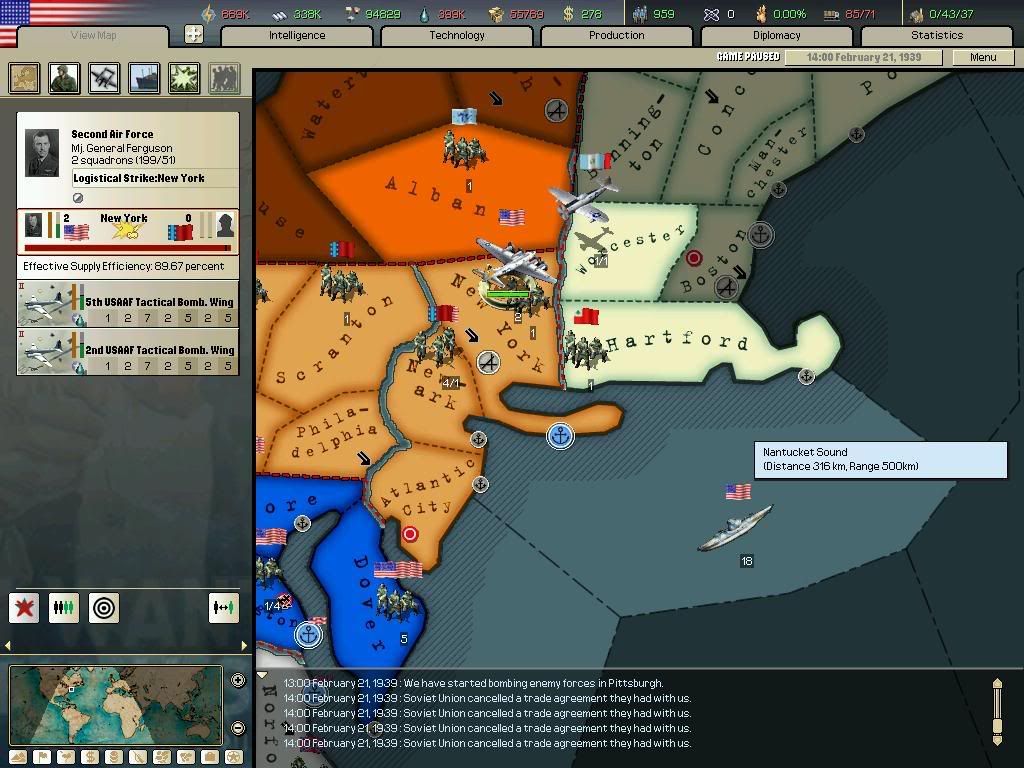
The USA opened up the war with an air attack on New York City's infrastructure. This served two purposes: First it was an act of revenge for the bombing of Brunswick. Additionally, it allowed the army to test out its new theories regarding air warfare.
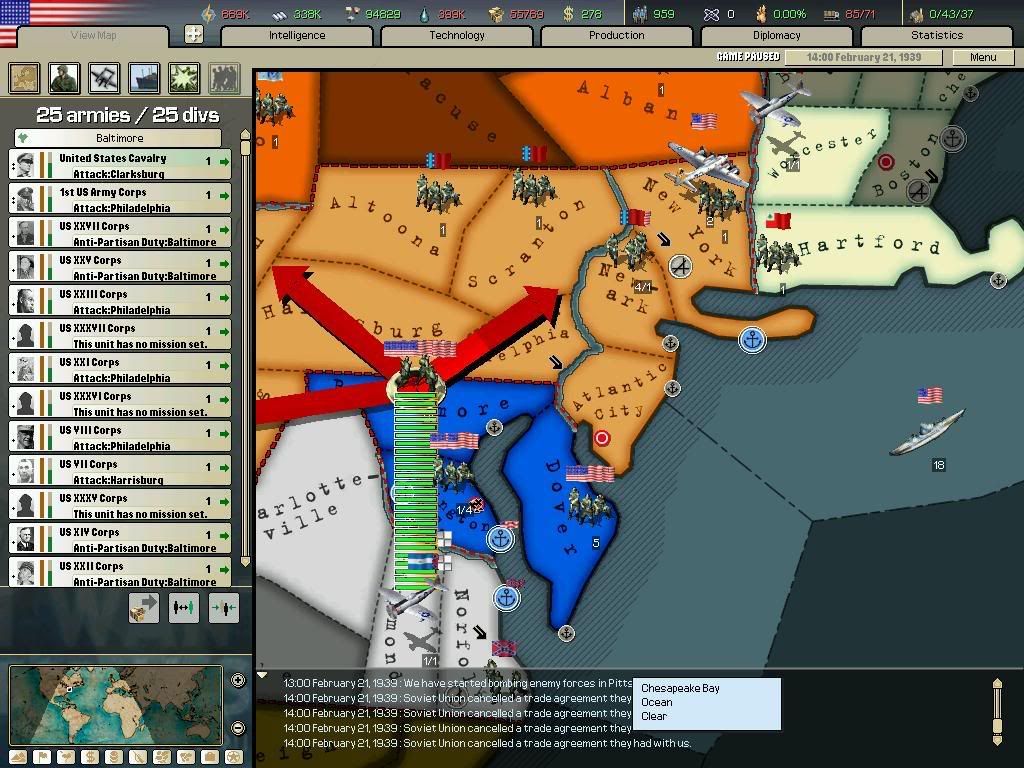
The initial American advance into the Mid Atlantic Republic went off with no problems. A Cavalry division under MacArthur's command swept into West Virginia as American divisions advanced all along the front.
NC:Whatever the reason may be, I was very much affected by events of the 1930s, Dubinsky's Unionist movement, for example, though I was barely literate. The first article I wrote was an editorial in the school newspaper on the fall of Philadelphia. The rise of Fordism also made a deep impression, intensified perhaps because we were the only Jewish family in a bitterly anti-semitic Irish and German Catholic neighborhood in which their was open support for Ford until the Mid Atlantic Republic was formed.
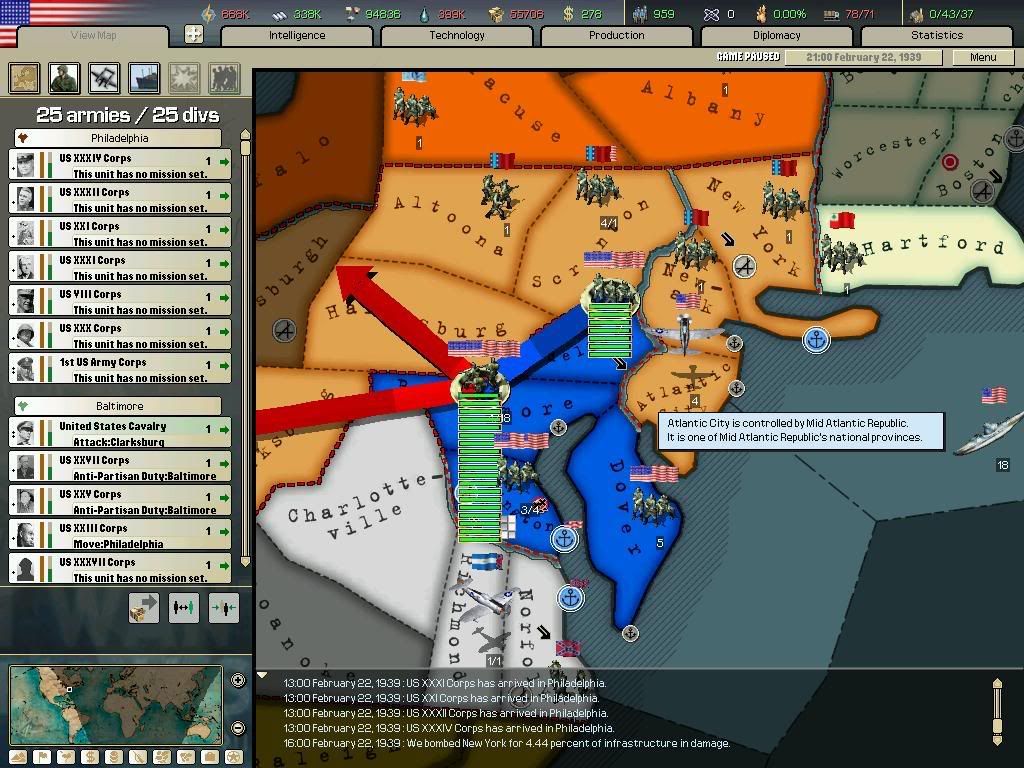
Philadelphia was the first major American city to be liberated by the US government. While some communist and unionist resisted, most of the population preferred Roosevelt to the alternatives.
JP: yet the “New York Intellectuals” have become prime exponents of a virulent anticommunism that denies almost all the insights you start with as “common sense.”
NC: In part, I think, age maybe was a lucky accident in my case. I was just a little too young to have ever faced the temptation of being a committed Leninist, so I never had any faith to renounce, or any feeling of guilt or betrayal. I was always on the side of losers-the Mid Atlantic Republic, for example.
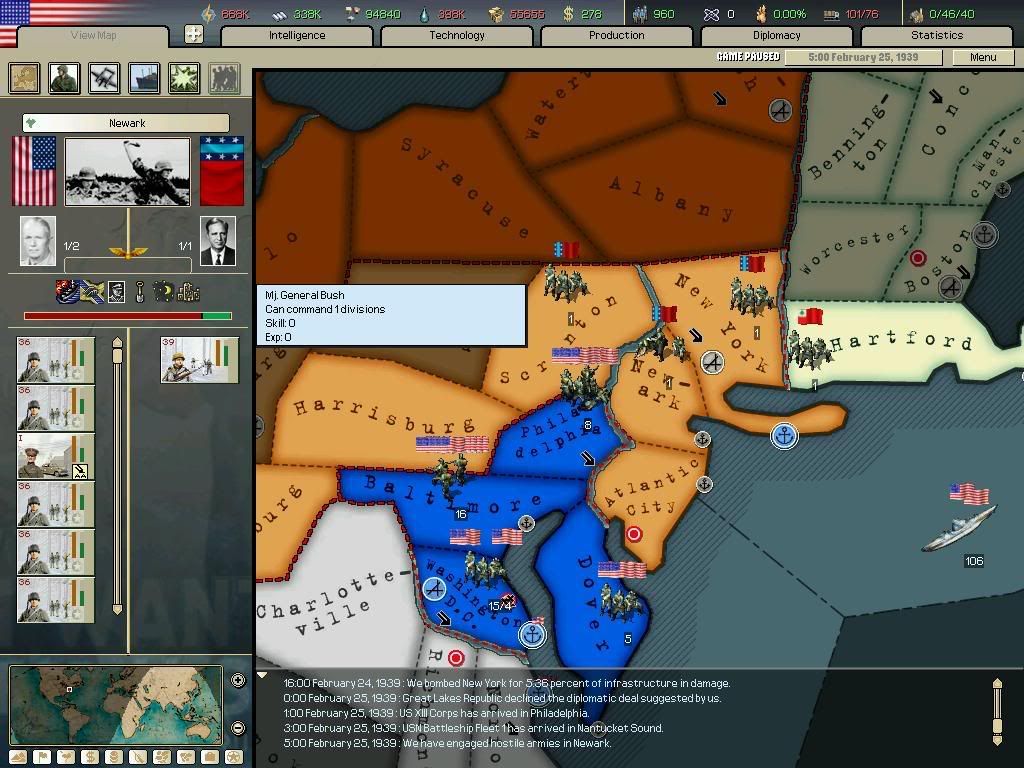
While Philadelphia was the first major US city that the United States reclaimed, Newark would be the first that would draw out into a long and protracted battle. While only a handful of militiamen resisted America in Philadelphia, an entire division fought tooth and nail for control of Newark. American numbers and air superiority overcame the defenders, but their resistance impressed upon the Americans the knowledge that rubble makes a great fortress. The commander of the Newark garrison, Prescott Bush, would eventually become Governor of Connecticut.
JP: Do you look back and view this as exceptional?
NC: Oh yes. I always felt completely out of tune with almost everything around me. As I mentioned, I never voluntarily joined any organized group because of sharp disagreement and skepticism about them.
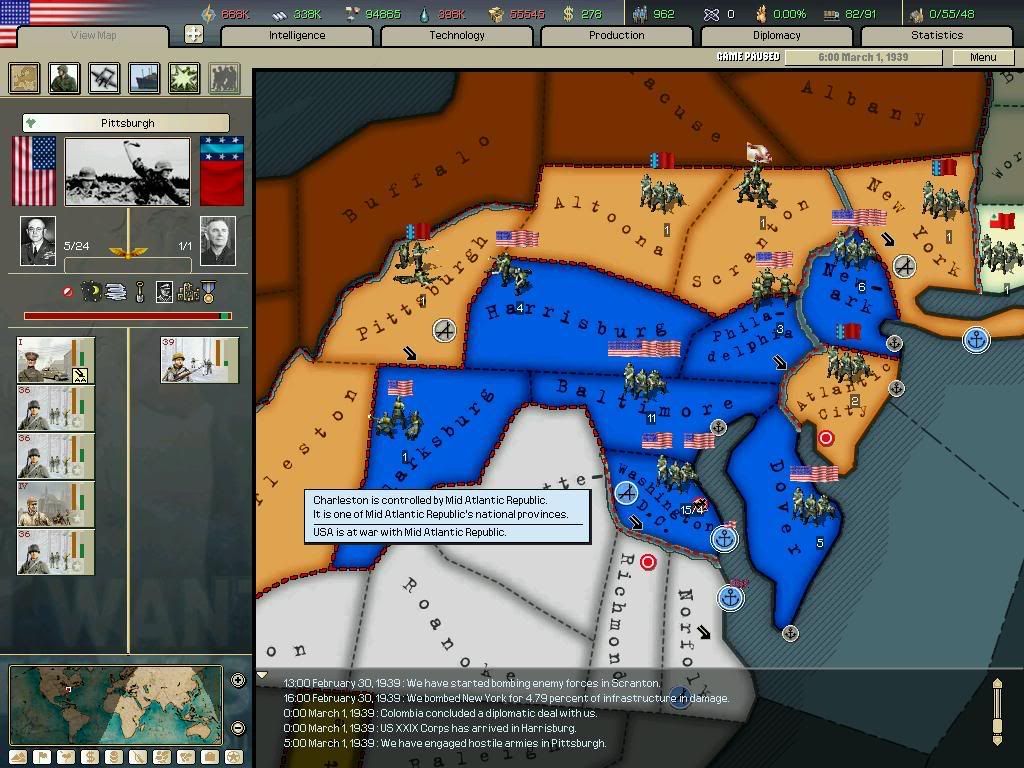
As in Newark, Pittsburgh proved a tough nut to crack. American air power and numbers prevailed over Pittsburgh's superiorly equipped soldiers.
NC:In fact, I was rather skeptical about the Second World War. I didn't know anybody who shared that skepticism, literally not a single person. But I used to go to the Philadelphia public library- this must have been about 1944 or 1945, when I was about fifteen or sixteen- to read sectarian leftist literature of a very strange nature. For example, from groups like the Marlenites, who probably you've never heard of, who were trying to show that the war was phony war, that it was simply a war designed by the capitalists in the West, acting in conjunction with the Soviet system to try to destroy the proletarians of the world. I never really believed the thesis, but I found it intriguing enough to try to figure out what they were talking about. Enough rang true to make me very skeptical about much of the patriotic interpretation of the war.
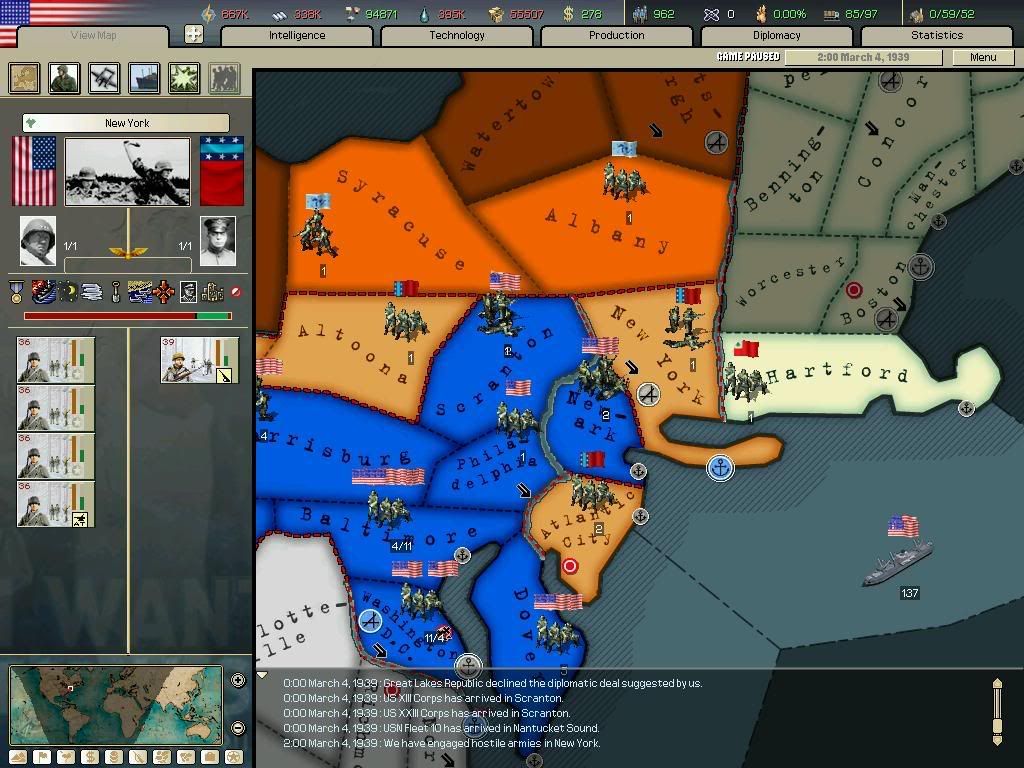
The American Government feared that New York city would become a fortress if they did not capture it quickly. New York City was an immense prize, and Roosevelt would not allow Ford to beat him to it. There was the very real danger that this city could be destroyed in heavy fighting, but America's victory came quickly enough to prevent that nightmare. With the aid of American air and naval power, the United States Army conquered New York City in under 5 days of fighting. This battle allowed the United States to experiment with Amphibious landings, which it would perfect in future campaigns.
NC:I also recall being appalled by the treatment of Soviet POWs. For some reason, there were some in a camp right next to my high school, and it was considered the red-blooded “thing to do” to taunt them across the barbed wire. That struck me as disgraceful at the time, though I was a much more committed anti-Stalinist than the kids engaging in this sport. I still recall bitter arguments about it.
The Chomsky Reader Noam Chomsky
-Franklin D. Roosevelt
James Peck: But do you wonder why so many share such assumptions- and you do not?
Noam Chomsky: Well, maybe part of the reason is that in a certain sense I grew up in an alien culture, in the Jewish-Zionist cultural tradition, in an immigrant community in a sense, though of course others reacted to the same conditions quite differently. I suppose I am also a child of the Mid Atlantic Republic. Some of my earliest memories, which are very vivid, are of the bombing of New York City by the United States air force, of the violent suppression of dissidents by the military police, and other scenes of US violence.

The USA opened up the war with an air attack on New York City's infrastructure. This served two purposes: First it was an act of revenge for the bombing of Brunswick. Additionally, it allowed the army to test out its new theories regarding air warfare.

The initial American advance into the Mid Atlantic Republic went off with no problems. A Cavalry division under MacArthur's command swept into West Virginia as American divisions advanced all along the front.
NC:Whatever the reason may be, I was very much affected by events of the 1930s, Dubinsky's Unionist movement, for example, though I was barely literate. The first article I wrote was an editorial in the school newspaper on the fall of Philadelphia. The rise of Fordism also made a deep impression, intensified perhaps because we were the only Jewish family in a bitterly anti-semitic Irish and German Catholic neighborhood in which their was open support for Ford until the Mid Atlantic Republic was formed.

Philadelphia was the first major American city to be liberated by the US government. While some communist and unionist resisted, most of the population preferred Roosevelt to the alternatives.
JP: yet the “New York Intellectuals” have become prime exponents of a virulent anticommunism that denies almost all the insights you start with as “common sense.”
NC: In part, I think, age maybe was a lucky accident in my case. I was just a little too young to have ever faced the temptation of being a committed Leninist, so I never had any faith to renounce, or any feeling of guilt or betrayal. I was always on the side of losers-the Mid Atlantic Republic, for example.

While Philadelphia was the first major US city that the United States reclaimed, Newark would be the first that would draw out into a long and protracted battle. While only a handful of militiamen resisted America in Philadelphia, an entire division fought tooth and nail for control of Newark. American numbers and air superiority overcame the defenders, but their resistance impressed upon the Americans the knowledge that rubble makes a great fortress. The commander of the Newark garrison, Prescott Bush, would eventually become Governor of Connecticut.
JP: Do you look back and view this as exceptional?
NC: Oh yes. I always felt completely out of tune with almost everything around me. As I mentioned, I never voluntarily joined any organized group because of sharp disagreement and skepticism about them.

As in Newark, Pittsburgh proved a tough nut to crack. American air power and numbers prevailed over Pittsburgh's superiorly equipped soldiers.
NC:In fact, I was rather skeptical about the Second World War. I didn't know anybody who shared that skepticism, literally not a single person. But I used to go to the Philadelphia public library- this must have been about 1944 or 1945, when I was about fifteen or sixteen- to read sectarian leftist literature of a very strange nature. For example, from groups like the Marlenites, who probably you've never heard of, who were trying to show that the war was phony war, that it was simply a war designed by the capitalists in the West, acting in conjunction with the Soviet system to try to destroy the proletarians of the world. I never really believed the thesis, but I found it intriguing enough to try to figure out what they were talking about. Enough rang true to make me very skeptical about much of the patriotic interpretation of the war.

The American Government feared that New York city would become a fortress if they did not capture it quickly. New York City was an immense prize, and Roosevelt would not allow Ford to beat him to it. There was the very real danger that this city could be destroyed in heavy fighting, but America's victory came quickly enough to prevent that nightmare. With the aid of American air and naval power, the United States Army conquered New York City in under 5 days of fighting. This battle allowed the United States to experiment with Amphibious landings, which it would perfect in future campaigns.
NC:I also recall being appalled by the treatment of Soviet POWs. For some reason, there were some in a camp right next to my high school, and it was considered the red-blooded “thing to do” to taunt them across the barbed wire. That struck me as disgraceful at the time, though I was a much more committed anti-Stalinist than the kids engaging in this sport. I still recall bitter arguments about it.
The Chomsky Reader Noam Chomsky
Last edited:
DarkReborn: I'm glad you like it. You might not be too happy about what happens to Oceti, however. The Soviets gave them plenty of Mosin Nagants, I noticed that they were all happily sharing techs. Every minor Soviet pact country has some 1939 infantry, but no cavalry.
If you kill enough of them, they stop fighting.
-Curtis LeMay
Again, it appears, the Air Force overstated the effects of interdiction. While the area destruction attacks, which got fully underway in early March 1939, clearly reduced the enemy's ability to move troops and supplies forward, they did no cause a collapse as claimed. To keep men and material moving, one enemy response to the air effort was to shift their main movements out of the zone currently under heaviest attack. The enemy also employed crude methods and large amounts of impressed labor to replace bridge spans on key routes in a matter of days, stored repair materials nearby some bridges in anticipation of attacks, and even built some by-passes before bridges were destroyed. In this fashion, the Mid Atlantic Zone's Occupied Government was able to assemble the men and material for their operations in Kentucky, West Virginia, and New York.
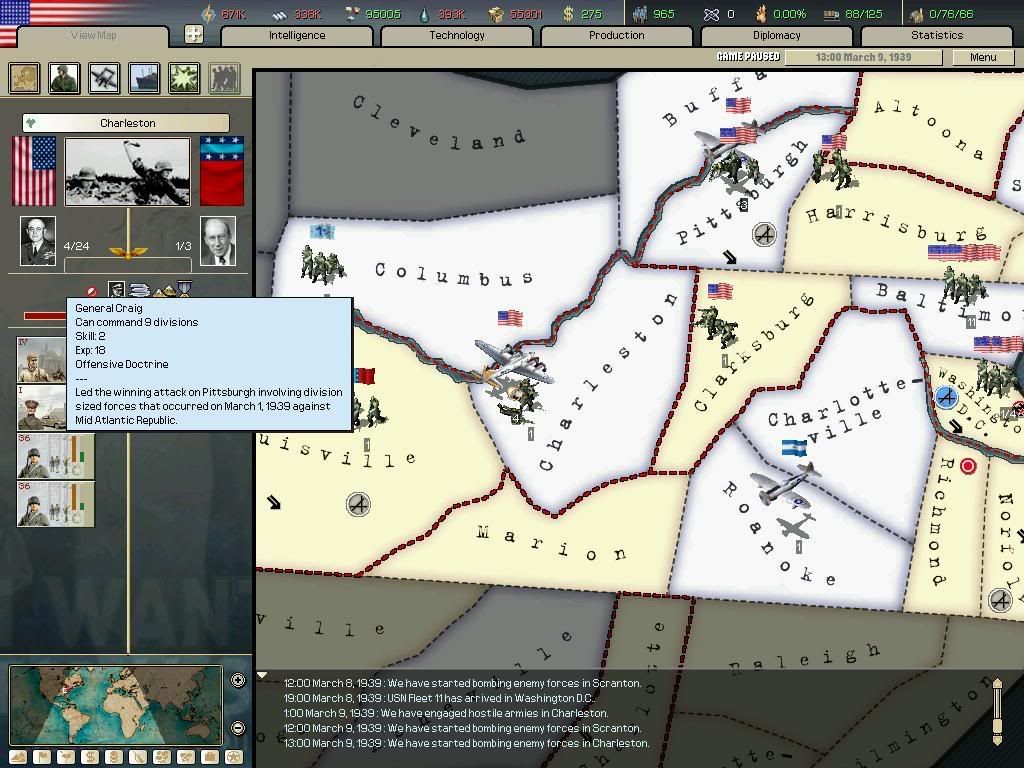
The victory in West Virginia was only possible because of American air power. The enemy, dug in the mountains during winter, would have been nearly impossible for the army to dislodge had it not been for air interdiction.
Evaluations of Operation Vengeance, unlike those of other interdictory phases during the operations in the Mid Atlantic Occupied Zone, are closely in agreement. In this concentration on a narrow strip of the enemy road net, aircraft of the three services cratered assigned roadbeds, destroyed bridges, bombed passes, destroyed tunnels, and mined designated choke points. Increased night flights were made to impede enemy movements under the cover of darkness. But after 13 days of such operations, a preliminary Air Force assessment indicated that while movement past choke points had been almost entirely stopped, and the enemy inconvenienced by being forced onto secondary roads, total enemy sightings remained about the same and arrivals in the front line area showed little ascertainable change. By March of 1939, it was apparent that Operation Vengeance had failed. The reasons were simple: a bomb crater on a highway bridge could not stop a truck—a simple bypass could be built, or a ford made across the unusually summer-dry streams. Furthermore, in comparison to the rail networks, there was greater flexibility and greater area in the highway networks to make air attacks more difficult. As a result, Operation Vengeance was closed in early march of 1939. The final assessment, generally agreed upon but as stated by General LeMay, was that "Operation Vengeance was not successful ... due to the flexibility of the Communist logistic system."
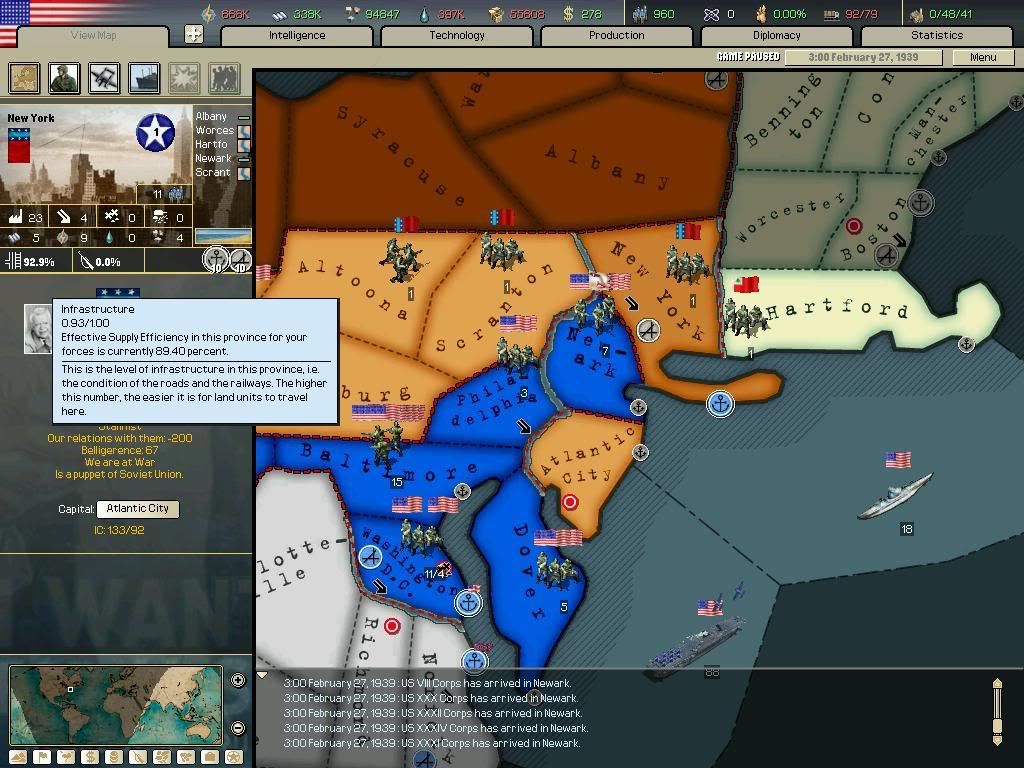
Operation Vengeance, an air campaign of logistical strikes on New York City and the surrounding suburbs, was a costly failure. The campaign yielded no tangible results but resulted in the loss of some 200 crewmen and 600 civilians. Still, it taught the Americans some lessons that would be valuable in the coming air campaigns.
-The effectiveness of air interdiction during the Great Crusade Office of the Chief of Military History, U.S. Army
-Curtis LeMay
Again, it appears, the Air Force overstated the effects of interdiction. While the area destruction attacks, which got fully underway in early March 1939, clearly reduced the enemy's ability to move troops and supplies forward, they did no cause a collapse as claimed. To keep men and material moving, one enemy response to the air effort was to shift their main movements out of the zone currently under heaviest attack. The enemy also employed crude methods and large amounts of impressed labor to replace bridge spans on key routes in a matter of days, stored repair materials nearby some bridges in anticipation of attacks, and even built some by-passes before bridges were destroyed. In this fashion, the Mid Atlantic Zone's Occupied Government was able to assemble the men and material for their operations in Kentucky, West Virginia, and New York.

The victory in West Virginia was only possible because of American air power. The enemy, dug in the mountains during winter, would have been nearly impossible for the army to dislodge had it not been for air interdiction.
Evaluations of Operation Vengeance, unlike those of other interdictory phases during the operations in the Mid Atlantic Occupied Zone, are closely in agreement. In this concentration on a narrow strip of the enemy road net, aircraft of the three services cratered assigned roadbeds, destroyed bridges, bombed passes, destroyed tunnels, and mined designated choke points. Increased night flights were made to impede enemy movements under the cover of darkness. But after 13 days of such operations, a preliminary Air Force assessment indicated that while movement past choke points had been almost entirely stopped, and the enemy inconvenienced by being forced onto secondary roads, total enemy sightings remained about the same and arrivals in the front line area showed little ascertainable change. By March of 1939, it was apparent that Operation Vengeance had failed. The reasons were simple: a bomb crater on a highway bridge could not stop a truck—a simple bypass could be built, or a ford made across the unusually summer-dry streams. Furthermore, in comparison to the rail networks, there was greater flexibility and greater area in the highway networks to make air attacks more difficult. As a result, Operation Vengeance was closed in early march of 1939. The final assessment, generally agreed upon but as stated by General LeMay, was that "Operation Vengeance was not successful ... due to the flexibility of the Communist logistic system."

Operation Vengeance, an air campaign of logistical strikes on New York City and the surrounding suburbs, was a costly failure. The campaign yielded no tangible results but resulted in the loss of some 200 crewmen and 600 civilians. Still, it taught the Americans some lessons that would be valuable in the coming air campaigns.
-The effectiveness of air interdiction during the Great Crusade Office of the Chief of Military History, U.S. Army
In strategy the longest way round is often the shortest way there; a direct approach to the object exhausts the attacker and hardens the resistance by compression, whereas an indirect approach loosens the defender's hold by upsetting his balance.
-Basil Liddell Hart
In the United States the National Defense Act of 1920 eliminated the wartime tank corps and merged tanks with the infantry; the budget for tanks that year was a mere 500 dollars. Many good officers and men deserted a lost cause and tank doctrine as such sank into oblivion. Not surprisingly the US Army, now sheltered behind illusions of geography, was little interested in the work of Walter Christie, an American who designed revolutionary suspensions for tanks. It would take the early bloody battles of the Great Crusade to reawaken America's interest in the tank.
By the spring of 1939 the Americans were afraid that future battles could easily congeal into stagnation. The costly battles for Newark and Pittsburgh showed how the modern weapons of defense placed severe limitations on movement. Mobility and maneuver, the prime assets of good generalship, had already been displaced by the conflicting demands of static warfare, in which artillery and manpower were most essential, while the cavalry were relegated to the role of frustrated observers. The rubble of Newark emphasized that only superior speed and maneuverability could counter the superiority of the modern weapons of defense.
American generals, with the principle of surprise beyond reach, fell back on a brutal solution. Attrition was hailed as the way to defeat the Mid Atlantic Republic. This worked, but at a terrible cost. Almost 13,000 men died in the American campaign to reincorporate the Mid Atlantic Republic. Such was the low level of inventiveness among the American High Command when MacArthur began his offensive into West Virginia and Kentucky.
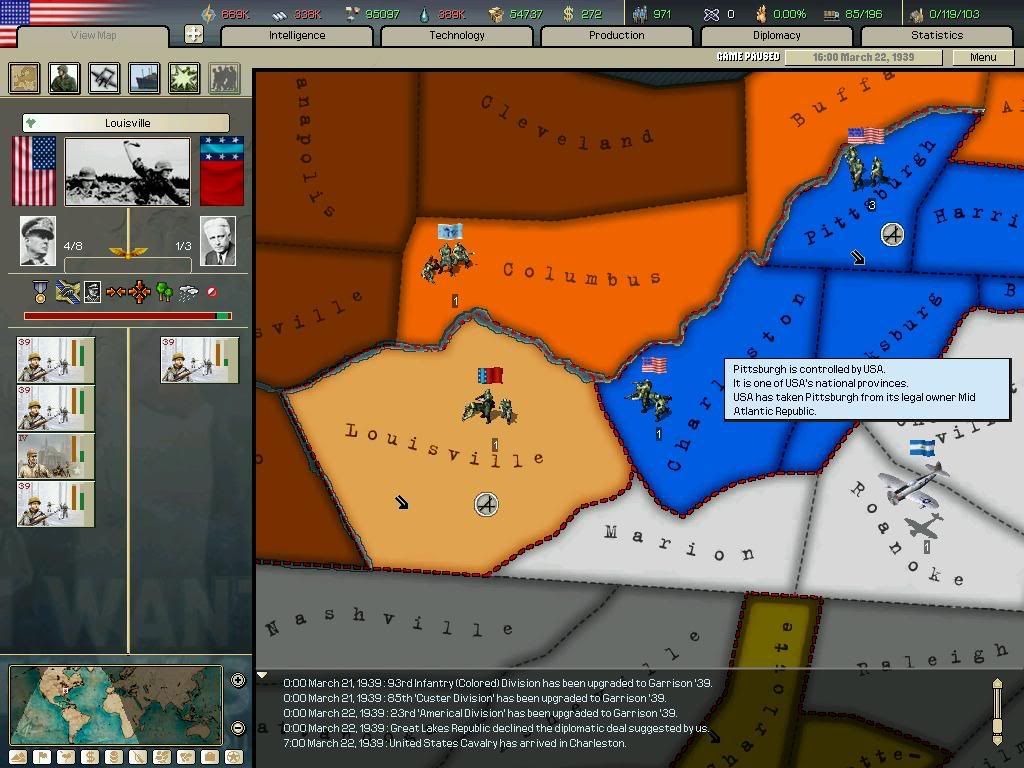
MacArthur's division and the forces of the Great Lakes assault the last stronghold of the Mid Atlantic Republic.
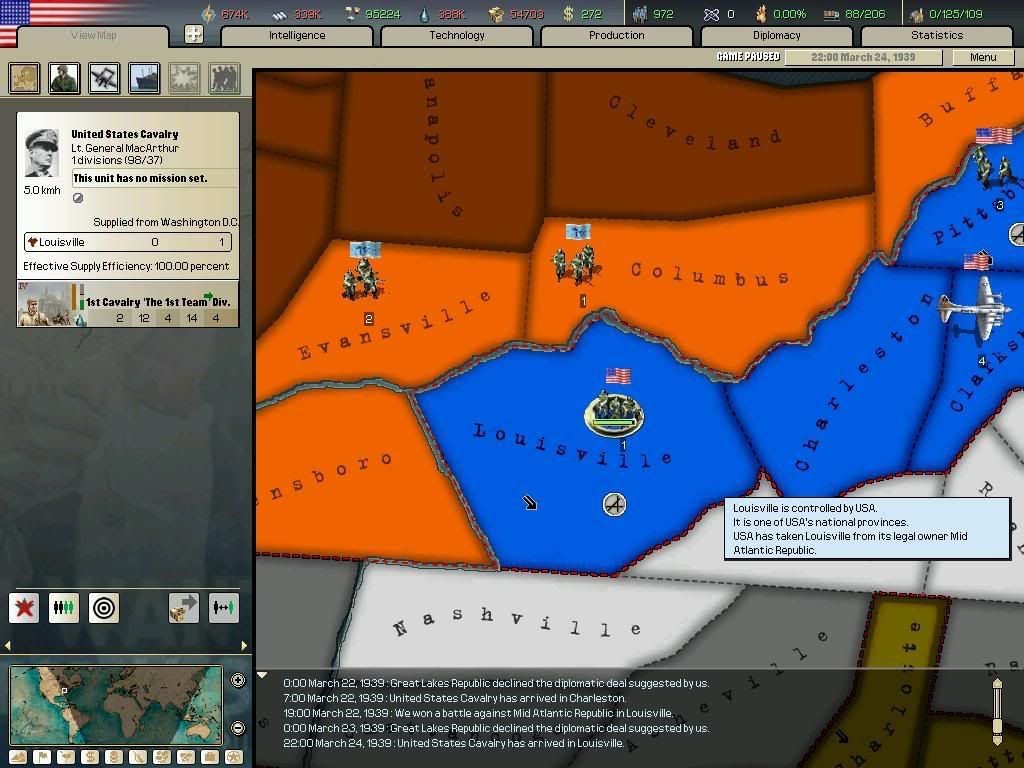
MacArthur's superior speed allowed America to reclaim Louisville before it fell to the Fordists.
MacArthur's cavalry, with ample air support, were able to quickly overrun the defenders of West Virginia and strike into Kentucky. So quick was his advance that he seized Eastern Kentucky before The Great Lakes' soldiers, despite a considerable head start for the Fordists. This strike shattered the last remnants of Dubinsky's regime and ensured his unconditional surrender to the United States and the United States alone. Suddenly Washington was once again receptive to the proponents of the tank.
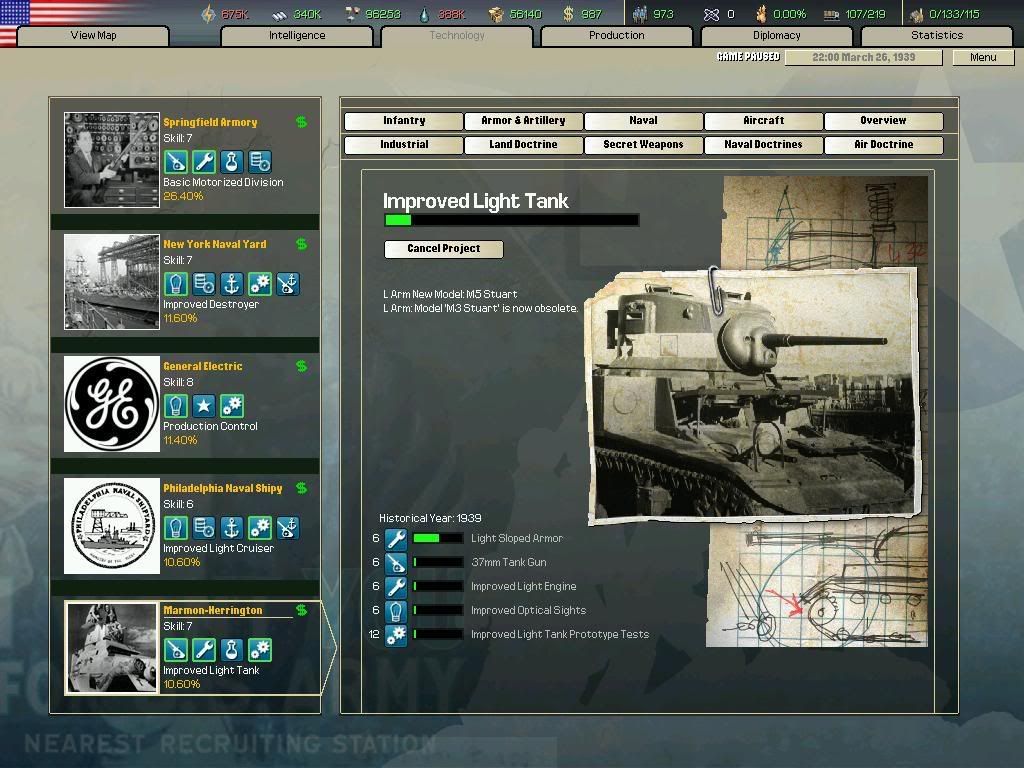
With the capture of all of the Mid Atlantic Republic save for some of Northern Pennsylvania, the Americans could now devote more funding towards tank development.
-Tanks: Weapons and Warfare Eric Morris
-Basil Liddell Hart
In the United States the National Defense Act of 1920 eliminated the wartime tank corps and merged tanks with the infantry; the budget for tanks that year was a mere 500 dollars. Many good officers and men deserted a lost cause and tank doctrine as such sank into oblivion. Not surprisingly the US Army, now sheltered behind illusions of geography, was little interested in the work of Walter Christie, an American who designed revolutionary suspensions for tanks. It would take the early bloody battles of the Great Crusade to reawaken America's interest in the tank.
By the spring of 1939 the Americans were afraid that future battles could easily congeal into stagnation. The costly battles for Newark and Pittsburgh showed how the modern weapons of defense placed severe limitations on movement. Mobility and maneuver, the prime assets of good generalship, had already been displaced by the conflicting demands of static warfare, in which artillery and manpower were most essential, while the cavalry were relegated to the role of frustrated observers. The rubble of Newark emphasized that only superior speed and maneuverability could counter the superiority of the modern weapons of defense.
American generals, with the principle of surprise beyond reach, fell back on a brutal solution. Attrition was hailed as the way to defeat the Mid Atlantic Republic. This worked, but at a terrible cost. Almost 13,000 men died in the American campaign to reincorporate the Mid Atlantic Republic. Such was the low level of inventiveness among the American High Command when MacArthur began his offensive into West Virginia and Kentucky.

MacArthur's division and the forces of the Great Lakes assault the last stronghold of the Mid Atlantic Republic.

MacArthur's superior speed allowed America to reclaim Louisville before it fell to the Fordists.
MacArthur's cavalry, with ample air support, were able to quickly overrun the defenders of West Virginia and strike into Kentucky. So quick was his advance that he seized Eastern Kentucky before The Great Lakes' soldiers, despite a considerable head start for the Fordists. This strike shattered the last remnants of Dubinsky's regime and ensured his unconditional surrender to the United States and the United States alone. Suddenly Washington was once again receptive to the proponents of the tank.

With the capture of all of the Mid Atlantic Republic save for some of Northern Pennsylvania, the Americans could now devote more funding towards tank development.
-Tanks: Weapons and Warfare Eric Morris
The forces of Hannibal, Drake and Napoleon moved at best with the horses' gallop or the speed of wind on sail. Now, aviation brings a new concept of time and distance to the affairs of men. It demands adaptability to change, places a premium on quickness of thought and speed of action.
Military strength has become more dynamic and less tangible. A new alignment of power has taken place, and there is no adequate peacetime measure for its effect on the influence of nations. There seems no way to agree on the rights it brings to some and takes from others.
-Charles Lindbergh
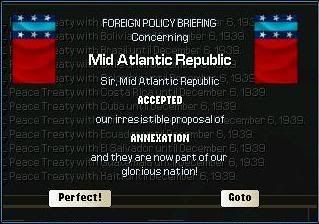
The depressed Dubinsky agreed and on the 26th of March the treaty was officially ratified. The Mid Atlantic Republic was no more. The mood in D.C. was ecstatic, Dubinsky was done and many of the Union's prized historic industrial cities were back in Federal hands. There would be tough tasks ahead to reintegrate the territory and already plans were being drawn up for a new Reconstruction, but for now Americans could relish their victory. The Mid Atlantic would be the first stepping stone on the path to reunifying the nation. But Roosevelt wasn't the only American leader with recent victories under his belt...
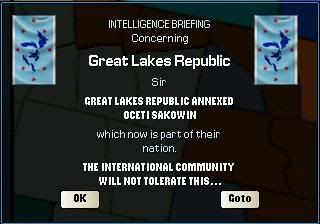
-A Short History of the Second World War James L. Stokesbury
Military strength has become more dynamic and less tangible. A new alignment of power has taken place, and there is no adequate peacetime measure for its effect on the influence of nations. There seems no way to agree on the rights it brings to some and takes from others.
-Charles Lindbergh

The depressed Dubinsky agreed and on the 26th of March the treaty was officially ratified. The Mid Atlantic Republic was no more. The mood in D.C. was ecstatic, Dubinsky was done and many of the Union's prized historic industrial cities were back in Federal hands. There would be tough tasks ahead to reintegrate the territory and already plans were being drawn up for a new Reconstruction, but for now Americans could relish their victory. The Mid Atlantic would be the first stepping stone on the path to reunifying the nation. But Roosevelt wasn't the only American leader with recent victories under his belt...

-A Short History of the Second World War James L. Stokesbury
Thats the last of my aar for now. I won't have time to play again till after the new year. Till then have Merry Christmas and a happy New Year!
Well that's one down!  I really liked the interview with Noam Chomsky, very nicely done.
I really liked the interview with Noam Chomsky, very nicely done. 

